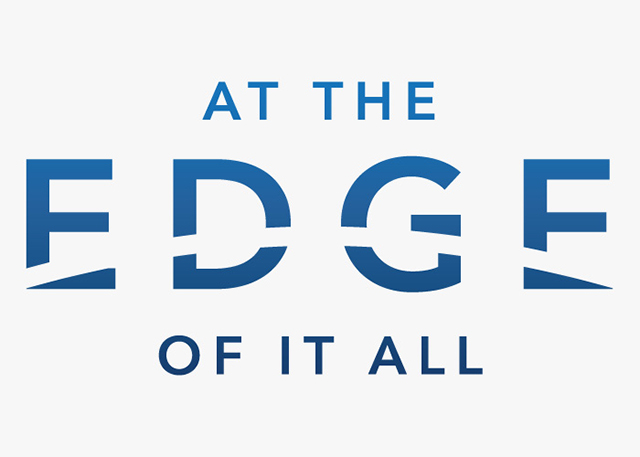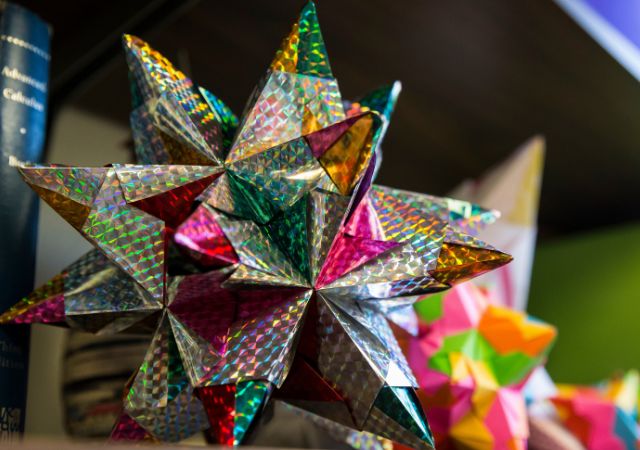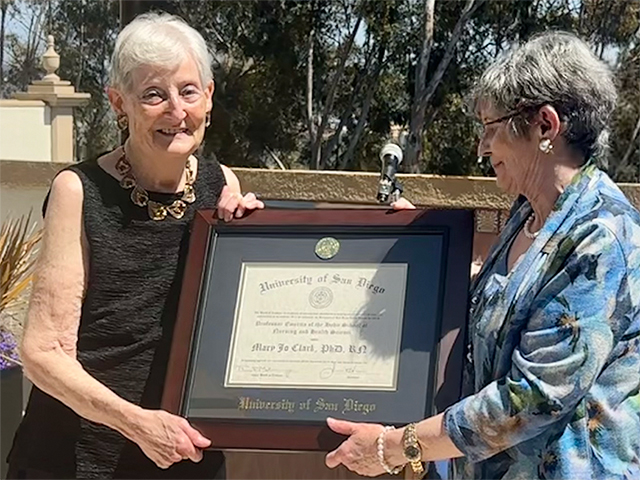An Inside Look at USD's First Carbon Neutral Class
Sustainability champion and USD School of Business Clinical Professor of Management, Abby Berk, PhD, has created the first carbon neutral class on University of San Diego’s campus.
Ethics and the Law 403 is an environmental management class this fall that’s been re-envisioned after not being taught on campus for more than 10 years. Made up of business and environmental sciences students, the class uses the USD campus as a learning lab. Students study the impact that businesses make on the world through an environmental prism and explore ways to make positive contributions.
“Over the semester we view corporations that recognize the responsibility they have to minimize their impact and, in some instances, have a positive impact,” Berk says.
In the class, Berk has witnessed students experiencing their own aha moments.
“I loved having the different students come together,” says Berk. “Business students say, ‘Wow, I thought about running a business but I didn't think about sourcing products,’ and ‘How do I make sure a company is environmentally conscious?’ For them, that was a new perspective. And environmental students say that while they already knew pollution was bad, ‘How do we change our operations?’”
“My favorite part of the class was learning about renewable energy and how it fits into how we use energy today,” notes business student Andrew Hernandez ’20. “Learning how we, as individuals, can make a difference by supporting companies that actually care about the environment was extremely beneficial.”
During the semester, students have visited the rooftop solar panels atop Mother Rosalie Hill Hall that were part of a renewable energy study, met with USD’s Office of Sustainability to learn about USD’s climate action plan and heard from City of San Diego Sustainability Manager Ashley Rosia-Tremonty. Students visited Cafe Gratitude and the San Diego Zoo as part of their study on vegan diets and biodiversity.
The class also considered the ways that USD is addressing environmental issues. For example, carbon dioxide is considered a leading contributor to global warming. In October 2019, USD President James T. Harris signed a Presidents’ Climate Leadership Commitment alongside USD student leaders. This action connects the university to a climate leadership network of colleges and universities who are acting on climate and preparing students through research and education to solve the challenges of the 21st century.
“We commit to going carbon neutral by 2035; to mobilize more resources for action-oriented climate change research and skills creation; and increase the delivery of environmental and sustainability education across curricula, campus and community outreach programs,” Harris says.
So, just what does it mean to be carbon neutral? “For example, we produce 1,000 metric tons of carbon in a specific time period and we know we’re going to put that into the atmosphere. To be carbon neutral means ‘let’s find an opportunity or project that captures 1,000 metric tons of carbon. So, it ends up being neutral.”
The idea that USD is going carbon neutral gave Berk an idea: “How do we become carbon neutral as a class, right now? Together we purchased offsets in the reforestation of the Amazon to create the very first carbon neutral class at USD.”
One of the most popular ways to capture carbon is to plant trees. “We have knowledge that trees capture carbon. There are projects called carbon offsets. For example, you can donate towards a forest being preserved or planted that can capture many metric tons of carbon.”
Students were shocked how inexpensive it was to be carbon neutral.
“When we did the calculations, it was actually so small that each of the 25 students are now carbon neutral for their own personal semesters,” Berk says.
Without purchasing offsets, students can still do small things every day to benefit the environment. Hernandez has learned to make environmentally conscience changes in his daily life. “What I can do to be carbon neutral is walk more instead of driving and eat less meat,” he says.
“This generation is awesome,” Berk says. “Students can have a big impact right away by carpooling and watching their consumption of food and resources. To reach our goal we need everyone in on it. No one entity can solve our problems. We need everyone working together.”
— Chloe Zakhour ’21
Class-related photos provided by USD School of Business Clinical Professor Abby Berk, PhD. President Harris and student leaders photo by Ryan T. Blystone
Contact:
USD News Center
news@sandiego.edu
(619) 260-4681




